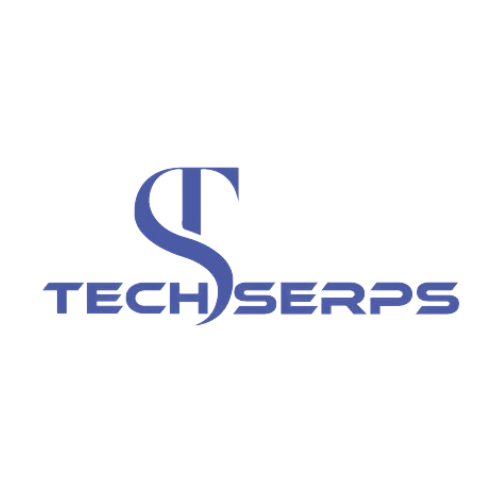In today’s rapidly evolving healthcare environment, technology skills are essential for a registered nurse to provide the best possible patient care. Technology helps nurses streamline their daily tasks, improve patient outcomes, increase efficiency, and support clinical decision-making. From managing electronic health records (EHR) to utilizing advanced medical equipment, nurses must be proficient with various technologies to thrive in modern healthcare.
This article will discuss the necessary technology skills for a registered nurse, the importance of mastering these tools, and how they impact the overall quality of care in a nursing practice.
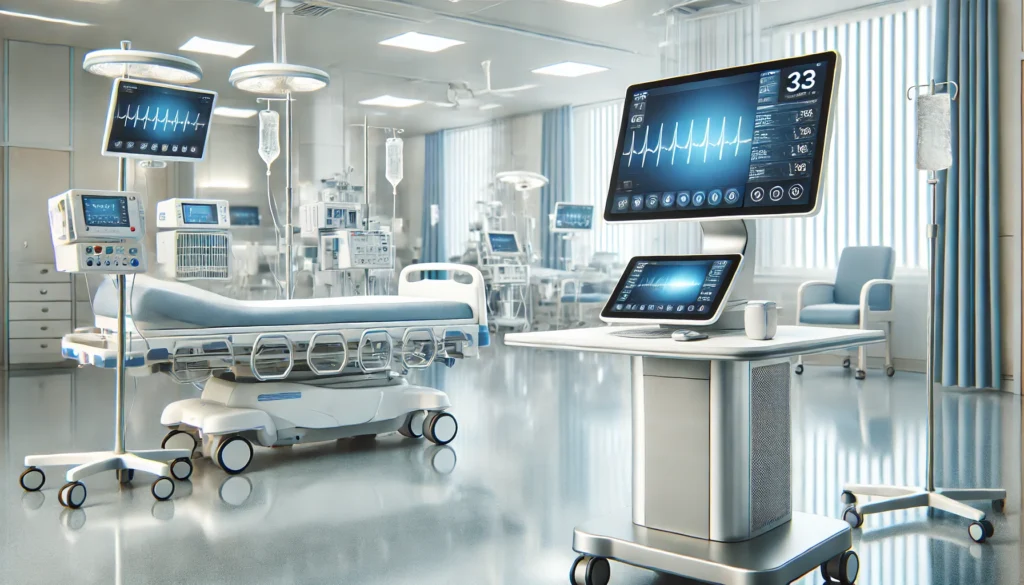
Mastering Electronic Health Records (EHR)
One of a registered nurse’s most critical technology skills is proficiency in electronic health records (EHR) systems. EHRs are digital versions of a patient’s medical history, allowing nurses to store, retrieve, and share information quickly and securely. Familiarity with EHR systems helps nurses monitor patient data, track progress, and update medical records in real-time.
Key benefits of EHR include:
- Improved accuracy of patient data.
- Enhanced coordination among healthcare providers.
- Increased patient safety by reducing errors.
A registered nurse skilled in EHR systems can efficiently manage patient records, leading to better treatment decisions and smoother communication with other healthcare professionals.
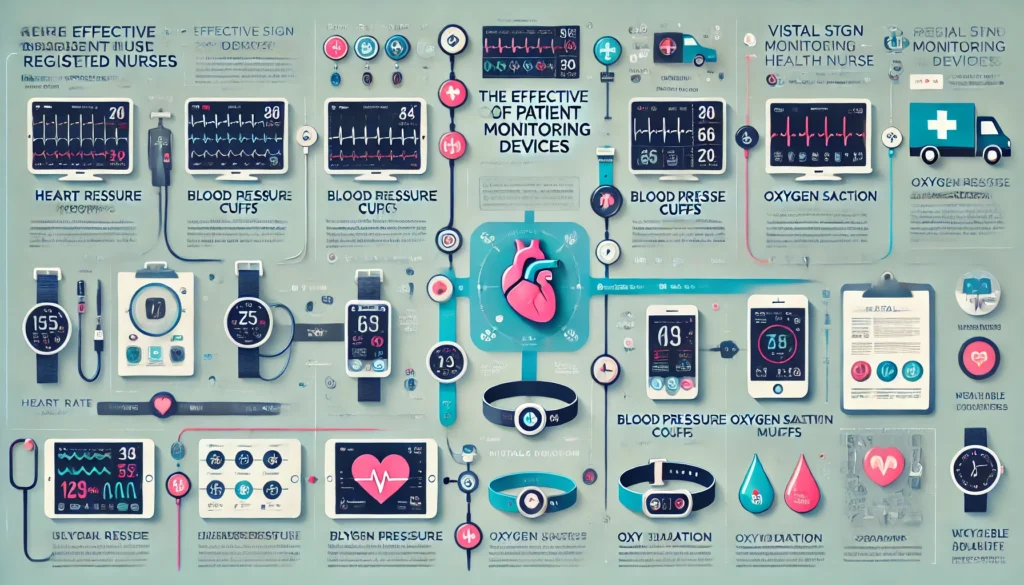
Using Patient Monitoring Devices Effectively
Necessary technology skills for a registered nurse also include operating patient monitoring devices. These devices track vital signs such as heart rate, blood pressure, and oxygen saturation. As healthcare moves toward more data-driven care, registered nurses must know how to use various monitoring tools to assess patient conditions accurately.
- Wearable Devices: These devices allow for continuous monitoring of a patient’s health, and nurses must be able to interpret the data effectively.
- Vital Sign Monitors: These tools are essential in both critical and non-critical settings, and understanding how to use them correctly ensures that nurses can take quick, informed actions when a patient’s condition changes.
Mastering these devices improves patient care and ensures that nurses can react to emergencies quickly and confidently.
Navigating Telemedicine Platforms
Telemedicine has grown significantly in recent years, and necessary technology skills for a registered nurse now include the ability to navigate telemedicine platforms. With telemedicine, patients can consult with healthcare providers remotely, and nurses are often the first line of contact.
Skills in telemedicine include:
- Familiarity with video conferencing tools.
- Managing virtual appointments and follow-ups.
- Ensuring privacy and confidentiality in virtual settings.
For registered nurses, telemedicine skills are becoming increasingly important in providing care for patients who live in rural areas or have mobility challenges. Nurses must be tech-savvy to ensure smooth virtual visits, manage patient concerns, and remotely facilitate care.
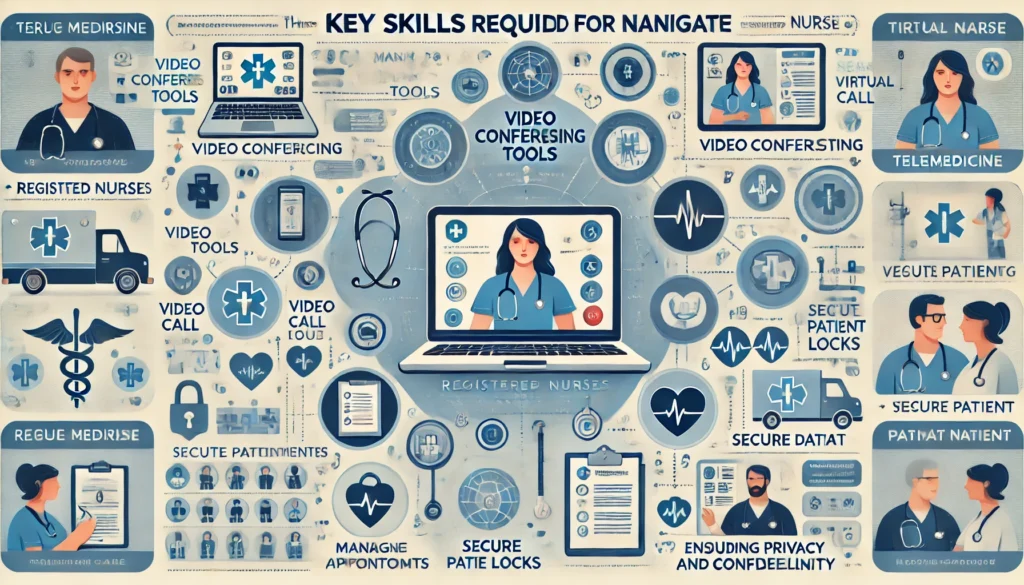
Understanding Medical Software and Data Systems
Nurses need to be proficient in using medical software and data systems to manage various aspects of patient care. These systems help nurses stay organized, monitor patient health, and provide better outcomes. Examples of medical software include scheduling software, medication tracking systems, and laboratory management tools.
A registered nurse with strong skills in these systems can:
- Ensure medications are administered correctly and on time.
- Coordinate with physicians and other healthcare staff seamlessly.
- Track lab results and diagnostic data quickly.
These systems make nursing workflows more efficient and ensure no steps are missed during patient care.
Familiarity with Robotic Surgery Assistance
As technology advances, more surgeries are being performed with the assistance of robotic systems. While the robot’s primary role falls to a surgeon, registered nurses need to be familiar with the necessary technology skills for a registered nurse related to robotic surgery. Nurses may assist in prepping the patient, managing robotic tools, or monitoring patient vitals during the procedure.
Some essential skills include:
- Understanding how robotic surgery systems work.
- Managing the equipment to ensure proper functioning.
- Assisting in patient positioning and preparation.
With the rise of minimally invasive robotic surgeries, knowing these technologies is becoming a valuable skill for nurses, particularly those working in surgical settings.
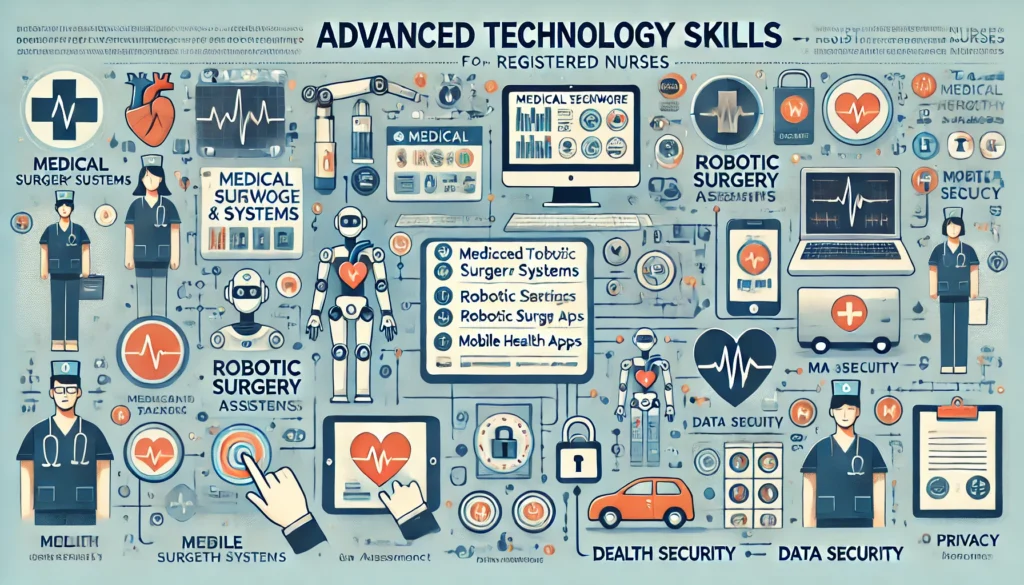
Using Mobile Health Apps for Patient Care
Necessary technology skills for a registered nurse also extend to mobile health (mHealth) apps. These apps help patients track their health data, and nurses can use them to monitor patient progress, track medications, or assess lifestyle changes.
Examples include:
- Diabetes Management Apps: Nurses use these apps to help diabetic patients monitor their blood sugar levels.
- Medication Reminder Apps: Nurses recommend these apps to ensure patients follow prescribed treatment plans.
Nurses should be proficient in guiding patients through these apps, ensuring they understand how to track their health, and addressing any concerns or challenges.
Data Security and Patient Privacy Knowledge
Given the sensitive nature of patient data, necessary technology skills for a registered nurse include understanding data security and patient privacy regulations, such as HIPAA (Health Insurance Portability and Accountability Act). Nurses are responsible for safeguarding patient information and ensuring that electronic records are kept secure.
Key aspects include:
- Understanding password management.
- Recognizing phishing attempts and other data breaches.
- Following institutional policies for handling electronic patient data.
By being well-versed in data security, nurses can prevent breaches of patient confidentiality and contribute to a trustworthy healthcare system.
Proficiency with Computerized Medication Administration Systems
Many healthcare facilities use computerized medication administration systems (CMAS) to manage and track patient medications. These systems help reduce medication errors and improve patient safety, making proficiency in using them a critical technology skill for a registered nurse.
Nurses use CMAS to:
- Ensure the correct medication and dosage are administered.
- Record patient responses and any potential side effects.
- Track medication administration history.
Mastering these systems ensures nurses can provide safe, accurate, and timely medication delivery, reducing the risk of adverse events.
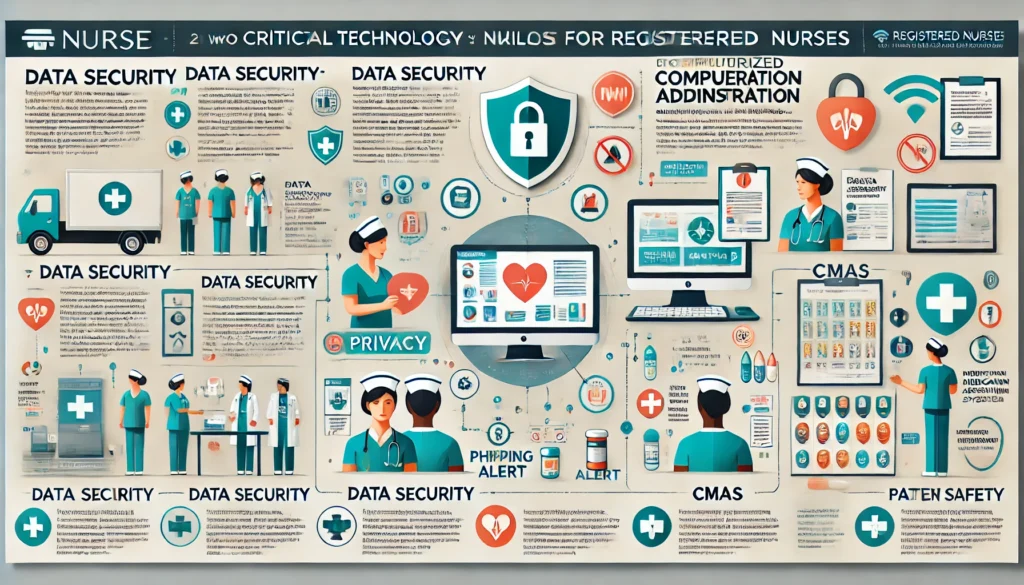
Proficiency in Virtual Patient Education Tools
Patient education is a fundamental part of nursing care, and necessary technology skills for a registered nurse now include using virtual tools to educate patients. Many hospitals and clinics use interactive videos, online resources, and educational apps to support patient education on post-operative care, chronic disease management, and wellness practices.
Registered nurses can guide patients through these tools:
- Recommending relevant videos or articles.
- Answering questions and addressing concerns virtually.
- Providing patients with online follow-up care instructions.
These virtual resources allow for better patient engagement, ensuring patients understand their health conditions and treatment plans.
Continuing Education and Technology Integration
As technology evolves, nurses must continually upgrade their necessary technology skills for a registered nurse through continuing education. Attending training sessions, workshops, and conferences ensures that nurses stay current with the latest tools, systems, and best practices in healthcare technology.
Nurses can:
- Attend webinars and workshops on new healthcare technologies.
- Complete certifications for specific healthcare software or equipment.
- Collaborate with other professionals to stay informed on technological trends.
Keeping up with advancements in healthcare technology helps nurses provide their patients with the highest level of care and remain competitive in their profession.
Conclusion
In the modern healthcare landscape, necessary technology skills for a registered nurse are no longer optional but essential. Technology enables nurses to provide more efficient, accurate, and personalized care, from managing electronic health records to utilizing mobile apps and telemedicine platforms.
Registered nurses proficient with these tools can enhance patient outcomes, increase safety, and reduce the likelihood of errors. As healthcare continues to evolve, nurses must stay up-to-date with the latest technologies to remain valuable members of the healthcare team and ensure the best care for their patients.
FAQs:
What are the most critical technology skills for a registered nurse?
A registered nurse’s essential technology skills include proficiency with electronic health records (EHR), patient monitoring devices, telemedicine platforms, and computerized medication administration systems. These tools are necessary for efficient and accurate patient care.
How does telemedicine impact a nurse’s role?
Telemedicine allows nurses to conduct virtual visits, provide patient education remotely, and monitor patient progress without requiring them to be in the same physical space as the patient. It offers greater flexibility and convenience for both nurses and patients.
Why is data security important for registered nurses?
Data security is crucial because nurses handle sensitive patient information. Understanding how to protect this data, comply with privacy regulations like HIPAA, and recognize potential security threats ensures that patient confidentiality is maintained.
What is the role of robotic surgery in nursing?
In robotic surgery, nurses prepare the patient, manage the robotic tools, and monitor the patient’s condition. While the surgeon operates the robot, nurses must be familiar with the technology to ensure a smooth and safe procedure.
How do mobile health apps benefit patients and nurses?
Mobile health apps allow patients to track their health and communicate with their healthcare providers. Nurses use these apps to monitor patient progress, manage chronic conditions, and ensure patients follow treatment plans.
